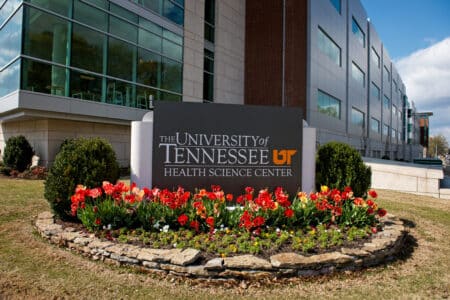The College of Graduate Health Sciences at the University of Tennessee Health Science Center (UTHSC) is the research training arm of UTHSC, with 12 advanced degree programmes leading to a PhD or MS, three Certificate programmes, and a Postdoctoral Scholars programme. The degree programmes are Biomedical Engineering, Biomedical Sciences, Dental Sciences, Epidemiology, Health Outcomes and Policy Research, Laboratory Research and Management, Nursing Science, Pharmaceutical Sciences, Pharmacology, and Speech and Hearing Science. The Certificate programmes are Clinical Investigation, Healthcare Quality Improvement, and Genomic Research Training.
Currently, there are approximately 350 students enrolled, approximately 100 postdoctoral scholars, and 514 faculty credentialed to teach graduate students and direct their research. Every student receives personal attention from their educators.
The entirely online 12-credit hour Certificate in Clinical Investigation provides essential clinical research skills and training to individuals interested in careers in this rapidly expanding job market. The programme also allows specialisation in Health Disparities or Health Behaviour Intervention.
Being 100% online, the Clinical Investigation programme accommodates those whose schedules may not easily allow traditional, classroom-based didactic courses. Online, self-paced courses are moderated by experienced research scholars within the College of Graduate Health Sciences.
As one student said, “The training was extremely valuable –– I have used the methods and principles learned to design several clinical trials, have been able to take an educational role with colleagues in Central America, have felt more capable of communicating with the statisticians at my institution, and have assisted colleagues at other institutions with statistical analyses when they did not have ready access to a statistician. Finally, my project led to a publication.”

Source: The University of Tennessee Health Science Center
The Certificate programme in Clinical Investigation generally requires two terms, fall and spring, to complete the 12-credit hour plan of study: Biostatistics for Public Health, Principles of Epidemiology, Fundamentals of Clinical Investigation, and either Introduction to Health Disparities or Health Behaviour Intervention. Applicants must have a health professional degree or a bachelor degree, with a grade point average of at least 3.0 from an accredited college or university; official transcripts; and two letters of recommendation. In addition, applicants must have sufficient computer literacy, English-language literacy, and technical skills to participate in web-based, graduate level courses.
Another certificate programme that went largely online is the Certificate in Healthcare Quality Improvement. As healthcare continues to evolve, more and more of the healthcare workforce will be involved in quality improvement.
You can advance your career and prepare to be an effective leader in improving healthcare quality and outcomes through the innovative hybrid Graduate Certificate in Healthcare Quality Improvement. This 12-credit hour programme prepares professionals in healthcare to implement quality improvement initiatives and to manage populations of patients to optimise efficiency and effectiveness of care and services.
Another student noted: “Excellent quality of teaching, both inside and outside the classroom; collegial environment; well-designed curriculum with both breadth and depth; ample opportunity for independent study — I love the idea of the faculty helping students develop ideas and projects which are individually relevant, and this opportunity was presented in virtually every class.”

Source: The University of Tennessee Health Science Center
Participants learn to use the techniques of statistical process control, selected tools from operations research and quality improvement, information management technology, and qualitative decision-making applications to ultimately improve clinical health outcomes for patients and communities. Specifically, graduates will be able to develop, implement, and evaluate healthcare quality and outcomes improvement initiatives; translate quality standards into daily operations; apply processes and tools to measure, analyse, and interpret quality improvement data; and understand information technology systems to support quality improvement.
The hybrid format, with mostly online courses and some face-to-face courses with video-conferencing capabilities, allows healthcare professionals to advance their education while working full-time. The programme generally requires two terms, fall and spring, to complete the 12-credit hour plan of study: Quality Management in Health Services, Health System Seminar, Mentored Quality Improvement Project, and two of Improving Patient Flow, Biostatistics for Public Health, Introduction to Health Disparities, or Epidemiology. The mentored project can be performed at the student’s job location.
Applicants must have a health professional degree or a bachelor’s degree, with a grade point average of at least 3.0 from an accredited college or university; official transcripts; and two letters of recommendation. In addition, applicants must have sufficient computer literacy, English-language literacy, and technical skills to participate in web-based, graduate level courses.
The other programmes offered by the College are delivered at one of its research locations throughout the state of Tennessee, the US, or at select sites throughout the world. These research training areas are largely funded by US$132 million in US federal grants.
In addition to its four campuses in Memphis, Nashville, Knoxville, and Chattanooga, the College has numerous affiliated research sites throughout the state and the world. Some of these are St. Jude Children’s Research Hospital, LeBonheur Children’s Hospital, Veteran’s Administration hospitals, the UT Medical Center in Knoxville, Oak Ridge National Laboratories, and numerous clinical sites.
The certificate programmes mentioned can be completed in as few as two terms (one year), MS degrees average 2.3 years, and PhD degrees average 5.3 years for completion. The research findings of the College’s students are highly regarded, with over 250,000 downloads of theses and dissertations to over 3,000 institutions in 172 countries.
If you are interested in advancing your career in the health sciences with a certificate, MS, or PhD degree, the College of Graduate Health Sciences at the University of Tennessee Health Science Center has what you need. Learn more here.
Follow The University of Tennessee Health Science Center on Facebook, Instagram, X, LinkedIn, and YouTube













